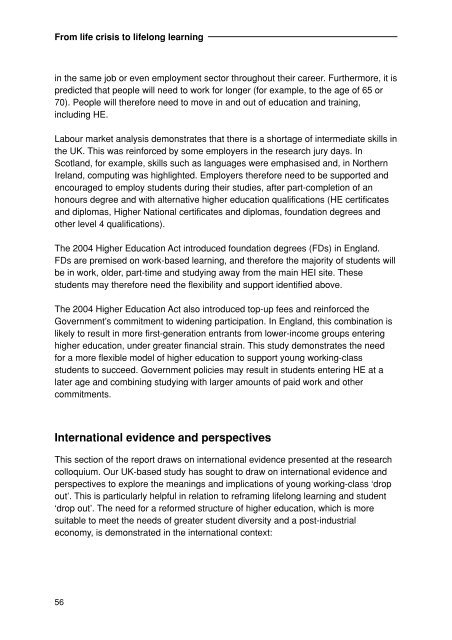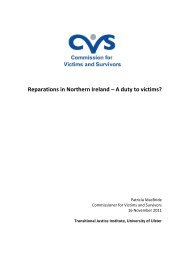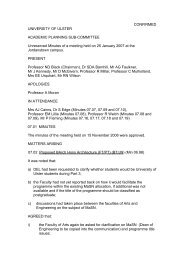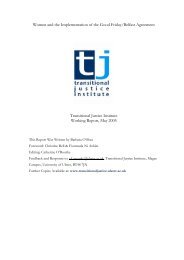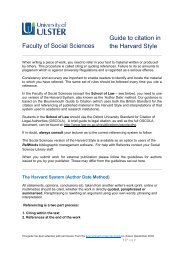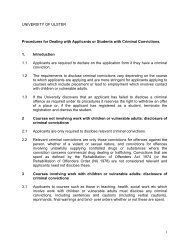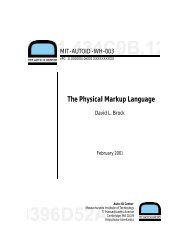From life crisis to lifelong learning: Rethinking working-class 'drop out'
From life crisis to lifelong learning: Rethinking working-class 'drop out'
From life crisis to lifelong learning: Rethinking working-class 'drop out'
You also want an ePaper? Increase the reach of your titles
YUMPU automatically turns print PDFs into web optimized ePapers that Google loves.
<strong>From</strong> <strong>life</strong> <strong>crisis</strong> <strong>to</strong> <strong>life</strong>long <strong>learning</strong><br />
in the same job or even employment sec<strong>to</strong>r throughout their career. Furthermore, it is<br />
predicted that people will need <strong>to</strong> work for longer (for example, <strong>to</strong> the age of 65 or<br />
70). People will therefore need <strong>to</strong> move in and out of education and training,<br />
including HE.<br />
Labour market analysis demonstrates that there is a shortage of intermediate skills in<br />
the UK. This was reinforced by some employers in the research jury days. In<br />
Scotland, for example, skills such as languages were emphasised and, in Northern<br />
Ireland, computing was highlighted. Employers therefore need <strong>to</strong> be supported and<br />
encouraged <strong>to</strong> employ students during their studies, after part-completion of an<br />
honours degree and with alternative higher education qualifications (HE certificates<br />
and diplomas, Higher National certificates and diplomas, foundation degrees and<br />
other level 4 qualifications).<br />
The 2004 Higher Education Act introduced foundation degrees (FDs) in England.<br />
FDs are premised on work-based <strong>learning</strong>, and therefore the majority of students will<br />
be in work, older, part-time and studying away from the main HEI site. These<br />
students may therefore need the flexibility and support identified above.<br />
The 2004 Higher Education Act also introduced <strong>to</strong>p-up fees and reinforced the<br />
Government’s commitment <strong>to</strong> widening participation. In England, this combination is<br />
likely <strong>to</strong> result in more first-generation entrants from lower-income groups entering<br />
higher education, under greater financial strain. This study demonstrates the need<br />
for a more flexible model of higher education <strong>to</strong> support young <strong>working</strong>-<strong>class</strong><br />
students <strong>to</strong> succeed. Government policies may result in students entering HE at a<br />
later age and combining studying with larger amounts of paid work and other<br />
commitments.<br />
International evidence and perspectives<br />
This section of the report draws on international evidence presented at the research<br />
colloquium. Our UK-based study has sought <strong>to</strong> draw on international evidence and<br />
perspectives <strong>to</strong> explore the meanings and implications of young <strong>working</strong>-<strong>class</strong> ‘drop<br />
out’. This is particularly helpful in relation <strong>to</strong> reframing <strong>life</strong>long <strong>learning</strong> and student<br />
‘drop out’. The need for a reformed structure of higher education, which is more<br />
suitable <strong>to</strong> meet the needs of greater student diversity and a post-industrial<br />
economy, is demonstrated in the international context:<br />
56


